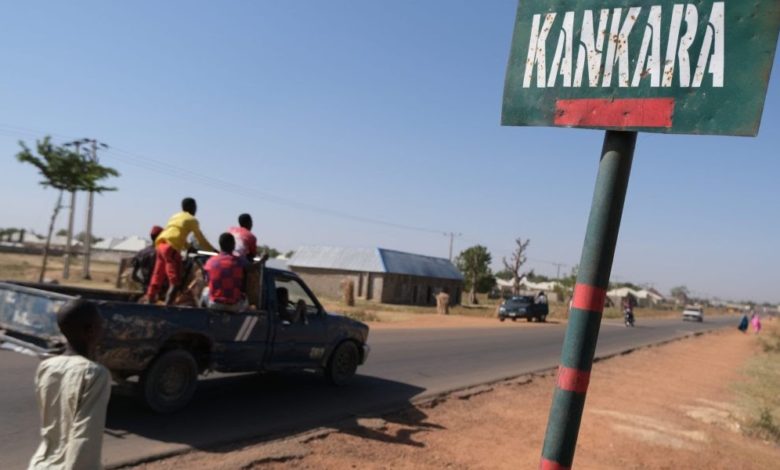Terrorists Becoming ‘Magnanimous’ As Governors Insist No Ransom Was Paid?

The governors of Katsina and Zamfara states have maintained that no money exchanged hands to secure the release of over 340 school students on Thursday, raising the question of whether the kidnappers suddenly became charitable.
Hundreds of school children were abducted on Friday, December 11, after terrorists stormed the Government Science Secondary School (GSSS) Kankara, in Katsina State.
Following six agonising days of waiting, during which Boko Haram repeatedly claimed responsibility for the attack, 344 of the students were released late Thursday evening. The students were delivered in Tsafe, Zamfara State, and transported back home last night.
The state governors’ accounts of how their freedom was secured have, however, been called to question.
Aminu Masari, Katsina State governor, said on Friday that no penny was offered to the abductors and thanked security agencies and members of Miyetti Allah Cattle Breeders Association of Nigeria (MACBAN) for their involvement in the negotiation process.
“We did not pay ransom to the kidnappers, it was purely negotiation,” he said.
This was also echoed by his counterpart in Zamfara, Bello Matawalle, who has blamed bandits for the kidnapping and said only 344 students were held, and not about 520 as claimed by Boko Haram or some of the abductees who escaped.
“When we established contact with them, I persuaded them to release them unharmed. And so they did tonight. This is not the first time we facilitated the release of our people without payment of ransom,” the governor told Daily Nigerian.
“Ask anybody, we don’t pay bandits a dime. What we do is to extend olive branch to them because they also want to live in peace.”
He added that his government was able to identify the culpable syndicate through help from the repentant bandits and leaders of the Miyetti Allah group.
In his statement on Friday, President Muhammadu Buhari appeared to emphasise the role of the army in securing the boys’ release. He said the security agency organised the operation and encircled the abductors.
“The military is well-trained. I think they are exceptionally motivated,” said the president, who has been in his hometown in Daura for close to a week.
He added that he was impressed with the governor, who had been “up and doing” since the abduction took place.
Meanwhile, in a video of the school children released by the Abubakar Shekau-led Boko Haram faction on Thursday, one of the schoolboys urged the government to pay their abductors a ransom and stop military rescue efforts so they could be released. It was the only request that was publicised by the terror group.
It is not the first time Nigerian authorities have claimed not to pay ransoms while negotiating the release of abducted children. Such denials, after all, help to dissuade other criminal gangs from orchestrating similar abductions with the hope of
Following the release of over 90 schoolgirls abducted in Dapchi in 2018, information minister Lai Mohammed said their freedom was secured through “back-channel efforts and with the help of some friends of the country”. But sources familiar with such negotiations said the only way the girls could have been released was through the payment of “a hell of a lot of money”.
Vice President Yemi Osinbajo similarly denied that a ransom was paid after 21 girls kidnapped from their school in Chibok, Borno State, were released in 2016. “There was no exchange of any kind … No such thing took place,” he insisted.
A hostage negotiator, however, told Associated Press that year that the deal involved “a ransom payment, a prisoner swap for Islamic extremist commanders, or both”. He said a handsome amount of money was paid by the government of Switzerland on behalf of the Nigerian government.
The following year, Wall Street Journal confirmed that a random of €3 million was secretary paid to Boko Haram members and five of their detained members were additionally swapped for the girls.
Federal lawmakers, during a deliberation in 2018, expressed concern about the trend of paying ransoms to terrorists, which they said was serving as a source of funding for their criminal activities.
“What happened is a lesson for us. That Boko Haram sees girls or women as value targets. What they did in Chibok earned them some funds, because negotiations were held somehow and they got a lot of money,” noted Ahmed Lawan, then Senate Leader and lawmaker representing Yobe North district.
“Now, the lesson is, we need to be extra careful and take extraordinary measures in protecting our schools; especially girls’ schools in those states especially Borno, Yobe and Adamawa.”
Support Our Journalism
There are millions of ordinary people affected by conflict in Africa whose stories are missing in the mainstream media. HumAngle is determined to tell those challenging and under-reported stories, hoping that the people impacted by these conflicts will find the safety and security they deserve.
To ensure that we continue to provide public service coverage, we have a small favour to ask you. We want you to be part of our journalistic endeavour by contributing a token to us.
Your donation will further promote a robust, free, and independent media.
Donate HereStay Closer To The Stories That Matter




